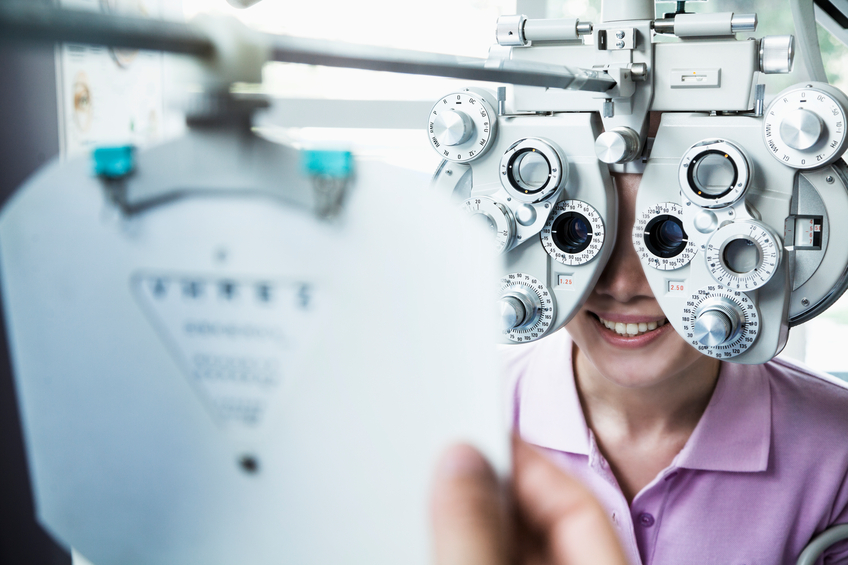The Link Between Sleep Apnea and Glaucoma
The Background
Over the last several years, research has indicated a strong correlation betwee...

Optometry Eyecare on the Avenue offers a complete range of eye care services for all of our patients.
Our services are designed to help you maintain your vision for as long as possible. Our goal is to catch vision problems and eye diseases before they interfere with life.
Sometimes vision problems can make daily life activities difficult. Yet many people don’t realize that a correctable vision problem is at the root of that difficulty.
In addition to providing vision care for the entire family, Dr. Peace specializes in the diagnosis and treatment of vision disorders that can interfere with reading, learning, work and other activities of daily life.
Not all vision exams are the same - experience the difference – schedule an appointment today.
The first step of your eye exam is designed to make sure there are no signs of eye disease that could be causing your symptoms.
We have the most up to date equipment to identify eye disease before it starts to impact your vision and while it is early enough to treat it, so it doesn’t cause a problem in the future.
If you are diagnosed with an eye disease, you want the best treatment available to get your eyes healthy again. Dr. Peace stays current with best treatment practices. Based on your diagnosis, we may recommend a wide variety of approaches, including improved nutrition, prescription medicines, vision therapy, or medical procedures.
Although many do not realize it, the best way to protect your vision is with a yearly eye checkup. Even a basic eye exam can instantly detect many health-threatening conditions, such as tumors, vascular irregularities, and diabetes-related injury to the retina (the back of your eye).
In addition to checking your distance vision, Dr. Peace will also test how well you can see your computer screen. If you work on a computer for 1 or more hours per day, be sure to measure the distance from your eyes to your computer screen.
Eye turns (a condition called Strabismus), have to do with an inability to point both eyes in the same direction at the same time. One eye—or both, as in crossed eyes—may appear to turn in, or one eye may turn out, up or down.
Eye turns can change from one eye to the other and may only appear after a person becomes tired or injured. It is not always noticeable, except through symptoms of difficulty with doing certain daily activities including clumsiness and difficulty with reading as well as other activities.
An eye turn may cause double vision. To avoid seeing double, the person may tend to ignore the visual images from one eye by turning his or her head while reading.
While surgery can straighten how the eyes appear cosmetically and your child is now able to see the letters on the eye chart (“20/20”), you or your child could still have eye coordination and eye movement disorders (Binocular Vision Disorders). Eye turns can often be treated non-surgically with a program of Vision Therapy.
Eyes that wander cause more than just an appearance problem. Non-optimum binocular vision can cause trouble with:
For more information about binocular vision click here.
If you or a loved one has an eye turn, be sure to schedule an appointment with Dr. Peace.
Copyright 2017-2023 © Bristol Communications

Corneal Refractive Therapy (CRT) is a great advancement in refractive therapy options. CRT allows you to see clearly during the day without glasses or contact lenses. Specially designed therapeutic lenses gently reshape the front surface of your eye while you sleep.
Imagine great vision all day without contacts, glasses, or surgery. No more problems from dust, allergies, or dryness. CRT has also been shown to slow the progression of nearsightedness in children and teenagers.
Previously, if you were nearsighted and wanted to see clearly during the day, your options were glasses, contacts, or laser surgery. CRT offers a non-surgical solution. No more worry about broken frames or torn contact lenses. Additionally, while LASIK is usually recommended only for those over 18 years of age, CRT is ideal for our younger patients who are active in sports and do not like the hassle of glasses or contacts.
For more information on Corneal Refractive Therapy, call today to schedule your FREE CRT consultation or visit Paragon at www.paragoncrt.com.
Enjoy Good Vision All Day Long Without Glasses or Daily Contact lenses
Are you concerned that you or your child is getting more nearsighted too quickly? We have a variety of treatment options which include daily contact lenses, eye drops, and special contact lenses that are worn during sleep.
Corneal Refractive Therapy (CRT) allows you to see clearly during the day without glasses or contact lenses. Specially designed therapeutic lenses gently reshape the front surface of your eye while you sleep allowing you to see clearly during your waking hours. CRT also stops the progression of nearsightedness from getting worse.
Imagine great vision all day without contacts, glasses, or surgery. No more problems from dust, allergies, or dryness. CRT has also been shown to slow the progression of nearsightedness in children and teenagers.
Previously, if you were nearsighted and wanted to see clearly during the day, your options were glasses, contacts, or laser surgery. CRT offers a non-surgical solution. No more worry about broken frames or torn contact lenses.
Additionally, while LASIK surgery is usually recommended only for those over 18 years of age, CRT is ideal for our younger patients who are active in sports and do not like the hassle of glasses or contacts.
For more information on Corneal Refractive Therapy, call today to schedule your FREE CRT consultation or visit Paragon at www.paragoncrt.com.
Binocular Vision Evaluation
During this evaluation, Dr. Peace tests how well both eyes are working together to provide single, clear vision throughout the day, in addition to testing all the other visual skills. A Binocular Vision Evaluation is needed in order to determine if you have all the visual skills required for all the varied activities we do in our lives – everything from reading, learning, computerwork, sports, etc. Some of these skills include:
Eye Movement (Tracking)
If you think about how you use your eyes when you read, you will find that your eyes move a lot; back and forth along the lines of print. Inadequate eye movements may cause a one to lose place when reading, have difficulty copying from the board, and skip or omit small words when reading.
Focusing
We need to change focus when shifting from looking at something up close to looking at something far away. During the day your child needs to change focus to see the board in the classroom and then read or write at the desk.
Symptoms of an eye focusing problem may include blurred vision while reading, inability to see clearly far away after reading, holding head very close to reading material and fatigue or headaches while reading.
Eye Coordination (Convergence)
When our eyes do not work together correctly, it may result in double vision, frequent loss of place when reading, headaches or eyestrain, and inability to stay focused or pay attention to visual tasks for any prolonged period of time. Sometimes the print may appear to be moving or double/blurry.
Eye-Hand Coordination
Educational tasks such as writing, drawing, as well as athletic skills such as throwing, hitting or catching a ball require well developed eye-hand coordination skills. Undiagnosed vision problems can cause difficulties with eye-hand coordination.
To determine whether a Binocular Vision Evaluation is needed please review the symptom checklist. (CREATE A LINK TO THE CHECKLIST).
Copyright 2017-2023 © Bristol Communications
Ideally all children should be examined at the ages of:
Most people don’t realize that vision develops and that you need 17 visual skills to succeed in reading, learning, sports, and in life. Being able to see the letters on the eye chart is just one of those skills. When children struggle with reading, it is time to ensure they have the visual skills required for academic success.
Vision problems that interfere with reading typically become more visible when students are required to read chapter books which contain a significant increase in text. At this point the text is also smaller. Children who have visual deficiencies that interfere with reading will start struggling even more with comprehension at this point. Typically, we hear children complain that the words are moving on the page, or they are having difficulty remembering what they read – even though they were able to read it out loud. This often results in parents and educators incorrectly assuming they can see the print just fine.
To be sure your child has all the visual skills required for reading and learning, schedule an appointment with Dr. Peace.
Copyright 2017-2023 © Bristol Communications
Tired of Red, Irritated, Watery or Dry Eyes?
Does it sometimes feel like there is sand in your eyes?
You are not alone. Your eyes could be irritated by a variety of different things, some of which include allergies, medication, auto immune disease or hormonal changes associated with aging, as well as working on the computer, smart phone or tablet for too long. Even your contact lens solution could be the culprit. But don’t despair – we can help!
Whatever the cause--- we have a variety of solutions available. Call today to schedule an appointment or click here to schedule online. INSERT LINK
Copyright 2017-2023 © Bristol Communications
Optometry Eyecare
on the Avenue
243 Mamaroneck Ave.
Mamaroneck, NY 10543
Phone: (914) 348-4280
Fax: (914) 348-4281
| Mon. | 10:00 AM — 6:00 PM |
| Tue. | 10:00 AM — 6:00 PM |
| Wed. | 10:00 AM — 6:00 PM |
| Thu. | CLOSED |
| Fri. | 10:00 AM — 6:00 PM |
| Sat. | 1:00 PM — 6:00 PM |
| Sun. | CLOSED |
The Background
Over the last several years, research has indicated a strong correlation betwee...